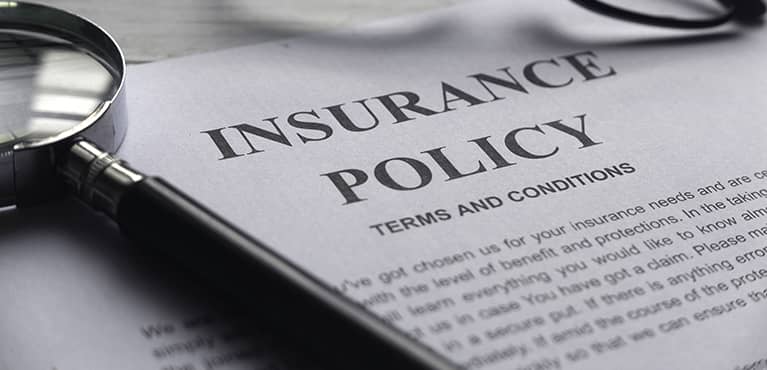Table of Contents
Table of Contents


Key Takeaways
- While uncommon, there are some instances when your life insurer won't pay out a death benefit.
- Understanding life insurance policy exclusions is crucial for ensuring your loved ones receive benefits.
- Honesty and accuracy in life insurance applications help prevent claim denials.
- Regularly reviewing and updating your life insurance policy can safeguard against changes in circumstances that might affect its payout.
- Knowing the process and potential reasons for claim denial can enable policyholders to take proactive steps to secure their coverage.
Life insurance is a lasting gift you can leave behind to your loved ones. As a way to replace some of your income, your death benefit provides some financial support to your loved ones, helping them cover monthly expenses, maintain their lifestyle and even save for the future.
However, there are reasons life insurance won't pay out. While uncommon, they do exist. Understanding what disqualifies life insurance payout can help prevent potential issues with your protection. Here's a rundown of the most common life insurance exclusions.
How Do Life Insurance Payouts Work?
Life insurance policies provide a death benefit to beneficiaries. The death benefit is a sum of money paid out to a designated person or entity. For many, a beneficiary is often a family member, such as a spouse or children.
After you pass, your loved ones report your death to the insurer by filing a claim along with a copy of the death certificate. The insurer then reviews the claim to ensure it meets policy terms. That includes verifying the cause of death, that the life insurance policy is still in force and that premiums are up to date.
Once everything is approved, the life insurance company pays the death benefit to your beneficiaries in their preferred manner. That may be in a lump sum or by installments.
What Are the Reasons Life Insurance Won't Pay Out?
In most cases, life insurers pay out death benefits. However, there are some specific reasons life insurance won't pay out. These tend to revolve around fraud and abuse. Life insurance is a contract between you and the insurance company. Misrepresenting yourself or providing inaccurate information on your insurance application can cause a breach and void the contract, ending with the claim denied.
What disqualifies life insurance payout? Here are nine common examples.
1. Policy Expiration
Life insurance coverage falls under two main categories: term and whole life. A whole life insurance policy covers you for your entire life, so provided all the premiums are paid, the policy doesn't end until you've passed. Term life insurance lasts for a pre-determined period (for example, 10, 20 or 30 years).
If you had a 20-year term policy and passed a decade into the coverage, the insurer would disburse your death benefit (again, as long as your premiums are paid). Once your term policy expires, the policy is no longer in force. That means you don't have existing coverage, so your loved ones won't receive a death benefit if you pass. However, that doesn't mean you can't get more coverage — many term life insurance policies allow for extending coverage, or you could purchase a new term or whole life policy.
2. Policy Lapse
Another reason life insurance won't pay out is due to a policy lapse. A policy lapse happens when you fail to pay your premiums. When that happens, the insurer may terminate your policy, leaving you without coverage. Some insurers may offer policyholders a short grace period to get up-to-date with payments. Your coverage remains intact during the grace period, which typically runs anywhere from 30 to 90 days, depending on the insurer.
If you don't keep up with your premiums, it may be challenging to reinstate your policy. And even if you do, you may have to pay more than you were before. Additionally, depending on your policy type, you may have to pay reinstatement fees and surrender charges. There could also be tax implications, especially if you've withdrawn from or borrowed against your policy.
3. Being Untruthful or Withholding Application Information
Life insurance applications require honesty. It's one reason many life insurance policies require a medical exam — it provides a fuller picture of your health. A critical part of the underwriting process pulls in the information you've shared about your medical history, lifestyle and hobbies. The underwriter uses this information to determine your premium based on the likelihood you may pass while covered.
For example, you may think there's no harm in saying you stopped smoking 10 years ago when it was actually five years ago or neglecting to mention your favorite hobby is skydiving. However, if you pass within the two-year contestability period and the insurer finds you misrepresented information on your application — especially information that's material to your death, such as health conditions or high-risk hobbies — then it may deny your claim.
4. Missing or Outdated Application Information
There are instances where information on a life insurance policy is missing or outdated, making it difficult for the insurer to pay out the death benefit. For instance, the insurer may be unable to find the beneficiaries or the primary beneficiary passed before the policyholder and there's no contingent beneficiary. In these cases, the insurer may hold the death benefit or, depending on state law, send it to your estate or your state's unclaimed money fund.
You can avoid this by regularly reviewing and updating the life insurance policy, especially after significant events, such as marriage, birth or divorce. That way, the insurer will have the most up-to-date information. That in turn reduces the risk of beneficiaries losing the life insurance policy and delaying payout.
5. Death From Illegal or Criminal Activity
If you die during an everyday activity, your insurer will likely pay out your death benefit to the beneficiaries. However, if you pass while doing something illegal, the insurance company can refuse payment.
Some illegal or criminal activities are obvious. If you die while using illicit drugs or stealing a car, for example, your insurer won't issue your death benefit to your loved ones. But what if you're doing something illegal you're unaware of at the time? Suppose you get into a fatal accident while exploring an abandoned property to take photos. If it was deemed you were illegally trespassing, then the insurer may not pay your death benefit.
6. Death From Suicide
Does life insurance cover suicide? It's a common question. Most life insurance policies include a suicide clause. Generally, if the policyholder commits suicide within a specified period from the start of the policy (typically two years), the insurer won't pay out the death benefit. Instead, the insurer may return the premiums paid into the policy to the beneficiaries.
However, reading the clauses and fine print on any life insurance application is essential. Some states may have different laws on the suicide clause's length of time, such as extending the period. Others may take the documented mental health of the policyholder into account. Both could potentially impact the claim outcome.
7. Death From Homicide
If the policyholder dies from homicide, insurers take additional steps to investigate and determine who should receive the death benefit. Generally, if the policyholder is killed by homicide and the beneficiaries aren't found to be at fault, the death benefit pays out as usual. If the death occurs within the first two years of the policy, insurers will take a closer look at the cause and circumstances around it.
However, there's also a clause called the "slayer rule." It holds that: If a person is responsible for a policyholder's death, they can't benefit from it by receiving the death benefit. If that happens, the death benefit can go to a contingent beneficiary or the policyowner's estate.
8. Excessive Travel or Living Abroad
Another reason why life insurance may not pay out is if you live in another country or frequently travel abroad. When applying for coverage, the insurer will ask where you list your residence, how frequently you travel and where. Here's another place where it's important to be honest. If you list your home residence in the U.S. but move to another country without updating your insurer and later pass away, it may reject your claim.
While short-term travel is often covered, your life insurance contract may have clauses against visiting certain countries your insurer deems riskier. The same applies if you frequently travel to riskier counties without citing it on your application. It's common for retirees to travel, for example. But if you were to pass away while out of the country, your insurer may decide not to pay out your death benefit. The same could be true if you travel more than you noted in your application.
9. Dying During the Policy Waiting Period
Life insurance policies typically have a waiting period, called a contestability period. Generally it's around two years after you first purchase coverage. Check your policy however for the exact dates. If the policyholder dies during the contestability period, the insurer often thoroughly investigates, even if the cause of death is traditionally covered under life insurance.
During this time, the insurer will review the circumstances around the policyholders' death as well as the application submitted in close detail to ensure nothing was misrepresented. If it finds the death didn't breach the contract terms, it will pay out the death benefit as usual. If the insurer finds misrepresentations, they can deny the claim or return any premiums paid to the beneficiary.
Optimize your policy to ensure life insurance payout readiness. Get a Free Life Insurance Quote
What Does Life Insurance Cover?
If you die under an existing policy, your premiums are up to date and the cause of death isn't excluded from your coverage, the insurer pays out a death benefit to your beneficiary. The death benefit can provide financial help to your loved ones, acting as a way to help replace your income, pay down debts or provide future financial security.
Life insurance covers the following:
- Most causes of death by old age, illness and other natural causes.
- Many deaths by accidents.
However, it's important to read your life insurance policy carefully, as your contract may not cover all causes of death. The policy will highlight exclusions, which are situations where the insurer won't pay the death benefit.
Some policies may also have riders, which allow for additional coverage. Riders are typically optional; you can add them to your policy, which usually increases the premium. Examples of common riders that life insurance can cover include:
- Larger payouts for accidental deaths.
- Under certain chronic or terminal illnesses, the option to receive your death benefit while alive to cover medical bills.
- Waivers for insurance costs if you become disabled and unable to work.
- Long-term care coverage may pay out your death benefit early if you're in a nursing home.
- The ability to convert current term coverage into a whole life policy.
Speak with a financial representative to learn how life insurance works and how much you may need to fit your financial situation.
How Long Does Life Insurance Take to Pay Out?
The time it takes for a life insurance payout after a claim will vary. The process can range from a couple of weeks to a few months. Typically, it takes between 15 and 90 days to receive the death benefit.
The life insurance payout process begins when a claim is filed and the death certificate is submitted, but there are a variety of factors that may extend the payout period, including:
- The death occurs during the contestability period. In this case, the insurance company will likely conduct a more thorough application review.
- The cause of death is under investigation. If the policyholder died under suspicious circumstances or the cause of death isn't clear.
- Incomplete documentation. The application may be missing key beneficiary information or wasn't updated after a major life change, like a divorce, and the insurer needs to find the beneficiary.
- Legal issues. Sometimes, there may be disputes between beneficiaries or surviving family members, which can delay the process as those get sorted.
- Death benefit goes to the estate. If no beneficiaries are named or they passed before the policyholder, the money may go to the estate. After that, the funds may become part of the probate process.
Are There Waiting Periods Before Life Insurance Pays Out?
Typically, there's no specific waiting period before a death benefit pays out. Due to the claim process, it can take a few weeks for the insurer to review the information and approve the claim.
If the policyholder dies during the contestability period or under suspicious circumstances, then it's more likely there will be a longer wait for the claim to be approved or denied. That can extend the waiting period for the death benefit.
The claims process is designed to protect insurance companies from fraudulent claims and manage their risk, but it can also influence the timing and validity of a potential payout.
What Can You Do If a Life Insurance Claim Is Denied?
Having the life insurance company deny your claim can be distressing, especially during an already emotional time. However, receiving a denial doesn't mean you're out of options.
Here are a few steps you can take if you feel the life insurance denial was unfair or wrong:
- Contact the insurance company. The first step is to understand why the claim was denied. Ask the insurer for a copy of the policy and a written explanation of why they issued a denial.
- File an appeal. Insurers should provide steps on how to file an appeal. Follow those while providing documentation and evidence to support your claim that their decision is incorrect. If you aren't getting help from the insurer, contact your state's insurance department or attorney general for advice.
- Seek legal help. Gather the policy and the insurer's explanation, including relevant documentation, and obtain advice from a legal professional. They can review the case and provide guidance on if you have the law on your side. They may also be able to negotiate with the insurer on your behalf.
There's no guarantee that a denial can be appealed and overturned. But there are options available to you. Don't be afraid to gather information and learn about the process. Insurers sometimes are willing to negotiate.
Get Help Understanding Your Life Insurance Coverage
Life insurance can sometimes feel complex — there's often a lot that goes into the fine print — but it can also be a vital tool to help provide some financial protection for your loved ones after you're gone. That's why it's important to understand how it works.
That's where working with a financial professional can help. They can help guide you through the ins and outs of life insurance to help make sure you have the best coverage for your needs. They can also explain the contract terms so you and your loved ones know what to expect from the application, riders and death benefit.
Enhance your family's financial security with life insurance. Get a Free Life Insurance Quote






































